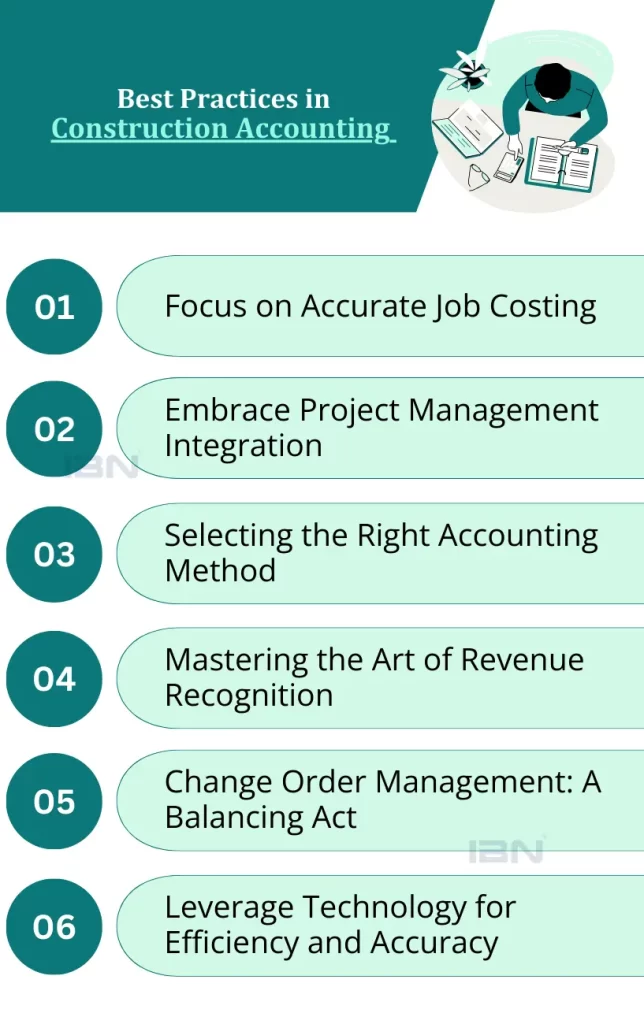Streamline Your Business Finances with Professional Construction Accounting Services
Streamline Your Business Finances with Professional Construction Accounting Services
Blog Article
Comprehending the Importance of Building And Construction Bookkeeping for Successful Project Administration

Function of Building And Construction Bookkeeping
Construction accountancy acts as the backbone of monetary administration in the building and construction industry, guaranteeing that jobs are finished within spending plan and financial goals are satisfied. construction accounting. This customized audit method addresses the special obstacles encountered in construction projects, including varying project durations, changing prices, and multiple stakeholders
One of the key roles of construction bookkeeping is to supply precise expense evaluation and tracking throughout the project lifecycle. This promotes educated decision-making, allowing job supervisors to readjust timelines and resources efficiently. Furthermore, building bookkeeping enhances capital monitoring by checking accounts receivable and payable, therefore guaranteeing that funds are available for prompt settlements to vendors and subcontractors.
Additionally, construction accounting help in compliance with industry laws and reporting requirements. It outfits job managers with the essential monetary data to prepare thorough monetary declarations, which are necessary for audits and monetary reviews. By preserving clear documents, building accounting cultivates transparency and liability, crucial parts in constructing count on amongst stakeholders. Ultimately, the duty of construction audit extends beyond plain monetary monitoring; it is integral to calculated preparation and operational effectiveness, driving the success of building and construction projects in an affordable landscape.
Trick Elements of Building And Construction Accounting

Budgeting establishes a monetary structure that overviews project execution, enabling supervisors to allot resources effectively and expect possible economic obstacles. Accurate cost tracking is vital for surveillance expenditures in real-time, helping to identify variances between projected and actual costs. This allows timely modifications to keep the job on budget plan.
Additionally, economic coverage supplies stakeholders with a clear image of the task's monetary health and wellness. Routine reports, such as profit and loss statements and capital analyses, facilitate informed decision-making and enhance openness amongst all celebrations entailed.
Furthermore, compliance with industry laws and accounting criteria is critical. This guarantees that monetary practices are not just reliable however likewise lawful, safeguarding the company against legal effects. By incorporating these essential components, building and construction audit promotes a structured strategy to handling funds, ultimately adding to the successful conclusion of building projects.
Advantages for Project Supervisors
Leveraging efficient building and construction bookkeeping methods gives task managers with a wide range of advantages that boost both functional efficiency and financial oversight. One considerable advantage is enhanced spending plan monitoring. Accurate tracking of expenses and incomes enables job supervisors to keep track of monetary efficiency in real time, ensuring projects remain within budget and helping with prompt modifications when essential.
In addition, construction accounting improves cash flow management, enabling task supervisors to prepare for monetary requirements and optimize resource allocation. By recognizing cash money inflows and outflows, they can better take care of settlements to vendors, employees, and subcontractors, therefore preventing costly hold-ups.
Furthermore, robust audit systems supply comprehensive coverage capabilities. Task managers can create reports that next page supply insights right into project earnings, cost differences, and source usage. This data-driven strategy promotes educated decision-making, allowing supervisors to recognize prospective concerns proactively and implement corrective measures.
Finally, adherence to construction accountancy criteria guarantees conformity with lawful and regulatory requirements, reducing the danger of disagreements or penalties. In general, efficient building and construction bookkeeping furnishes task supervisors with the tools required to drive job success, boost stakeholder self-confidence, and advertise long-term organizational growth.
Typical Difficulties in Building Audit
Several project managers encounter significant challenges in building bookkeeping that can impede job success. One of the primary challenges is the complexity of tracking multiple job sites, each with distinctive budgets, timelines, and source appropriations. This calls for thorough attention to detail, which can be overwhelming without a robust accounting system in position.
Additionally, fluctuating product prices and labor rates can complicate budget management, making precise forecasting difficult. Task supervisors commonly have a hard time to fix up these costs with real expenses, resulting in potential economic inconsistencies.
Furthermore, construction audit includes compliance with numerous guidelines, including tax obligation responsibilities and labor regulations. investigate this site Browsing these rules can be challenging, specifically for managers that may not have a solid accountancy background.
An additional considerable challenge is handling capital, which is vital in the construction market. Delays in invoicing, repayments from customers, or unforeseen task changes can develop capital scarcities, endangering the task's progress.
Finally, reliable interaction in between task managers, accounting professionals, and area groups is crucial. Misconceptions can lead to unreliable financial reporting, better complicating job monitoring initiatives. Dealing with these obstacles proactively is vital for effective construction bookkeeping.

Ideal Practices for Effective Accountancy
While navigating the intricacies of building audit can article source be overwhelming, embracing best techniques can substantially enhance monetary management and job success. One essential technique is preserving accurate and timely documents. Executing durable accounting software application customized to building tasks can improve information entry, invoicing, and coverage, decreasing mistakes and saving time.
Furthermore, developing a clear budget plan and normal monitoring against this budget plan are essential. Using a system of routine financial evaluations permits task managers to identify variations early, promoting timely decision-making. It is also necessary to different project costs into direct and indirect classifications, making it possible for more clear understandings right into profitability.
One more finest method entails promoting open communication among all stakeholders. Routine updates and collective conversations regarding monetary condition can make sure every person is straightened and educated. Educating personnel in construction-specific audit concepts better boosts expertise and precision.
Finally, making sure conformity with appropriate bookkeeping standards and regulations is non-negotiable. Regular audits and inner evaluations add to transparency and accountability, constructing trust fund with customers and stakeholders. By focusing on these ideal methods, building firms can maximize their audit processes, eventually driving job success and financial security.
Final Thought
In conclusion, construction audit plays an essential role in ensuring effective project management by assisting in precise economic oversight and improving decision-making. By incorporating crucial components such as price evaluation, cash money flow monitoring, and compliance, task managers can browse common difficulties and leverage finest techniques for efficient audit. Eventually, a durable construction accountancy framework not only safeguards spending plan integrity however additionally adds to the general economic health of building tasks, fostering lasting success within the sector.
By integrating these crucial parts, building accountancy fosters a structured technique to taking care of financial resources, inevitably adding to the effective completion of building jobs.
Exact monitoring of earnings and expenses allows task managers to monitor financial performance in genuine time, guaranteeing projects remain within budget plan and assisting in timely modifications when required.
Project supervisors can produce reports that offer insights right into task productivity, expense variances, and resource utilization.Numerous job supervisors run into considerable challenges in construction accountancy that can impede task success. construction accounting. Eventually, a robust building and construction accounting structure not only safeguards spending plan integrity however additionally contributes to the overall economic wellness of building and construction projects, fostering lasting success within the market
Report this page